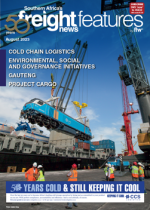Table Bay Cold Storage (TBCS) is making strides in enhancing its operations by adopting cutting-edge technologies and state-of-the-art infrastructure. With a commitment to ensuring the integrity of its clients' products, the company has recently implemented real-time temperature monitoring and tracking systems.According to general manager Shatho Manyanda, TBCS has embraced the rapidly evolving field of cold chain logistics."We are keeping up with the latest trends and best practices," he told Freight News. "One of the most significant developments in recent years is the increasing use of automation and robotics in cold storage facilities, which has improved efficiency and reduced costs."Implementing real-time temperature monitoring and tracking systems has been a game-changer for TBCS. The ability to closely monitor and track the temperature of products throughout the supply chain ensures that perishable items, such as food and pharmaceuticals, are maintained at optimal conditions. This advanced technology not only safeguards the quality and freshness of the goods but also provides valuable data for analysis, enabling swift corrective action in case of any temperature deviations.Manyanda said ensuring the integrity of products throughout the entire supply chain remained integral to the advancements introduced at TBCS."The logistics sector faces several challenges regarding the cold chain, including rising energy costs, load-shedding in South Africa, and increasing regulatory requirements. There also remains a shortage of skilled workers with expertise in cold chain management."With demand for fresh and frozen food on the rise, logistics service providers are under pressure to overcome these challenges and find solutions to the increasing focus on sustainability and environmental responsibility, and the greater emphasis on transparency and traceability throughout the supply chain. One such innovative solution that is increasingly being looked at to address the energy crisis is using renewable energy to maintain cold temperatures."There are many opportunities in the cold chain industry, particularly in emerging markets where demand for high-quality food products in the local and export market is in high demand," said Manyanda. "Additionally, there is a growing need for innovative solutions to improve supply chain efficiency and reduce waste. Energy efficiency innovations also come to mind."The sector's outlook is positive with the increase in cold chain volumes. "We believe that the demand for high-quality, temperature-sensitive products will continue to grow. However, we also recognise that the industry will face challenges in the coming years, particularly regarding sustainability and regulatory compliance. To stay ahead of the curve, it is essential to invest in new technologies and best practices to ensure that products are always delivered safely and efficiently," said Manyanda.

